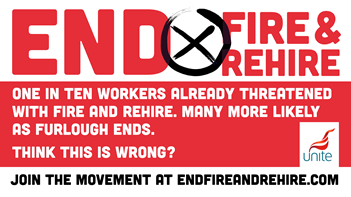“I’m not living, I’m existing”
Hajera Blagg, Thursday, October 16th, 2014In part 4 of our series, Britain Deserves a Pay Rise, UNITElive talks to a young man working for a local council who – despite being enthusiastic about his job – laments the way both young people and local authority workers get the shaft in austerity Britain.
Mikey Dick, 25, has worked as a bin man for Greenwich council for seven years. Even though he has a very stressful and low-paying job, he loves it.
“In so many ways, it really is a great job,” Dick effuses. “I get to meet new people ever day, I provide a vitally important service and I get to be outside for the most part instead of being stuck in an office.”
Still, driving a lorry and collecting refuse – a service we often take for granted – comes with lots of pressure. Dick notes how aggressive some people can be on the roads as they’re coming home from work.
“Some residents are very particular about certain things and sometimes aren’t happy with our service. So that can get you down,” he adds. “And then there’s the fact that we’ve been really understaffed recently, so we’re overloaded and have to work much longer hours. It can be really tough.”
As with many young people who’ve come of age in the era of austerity, Dick lived with his parents as an adult, unable to afford extortionate rents. But when he was 21, he decided he wanted to set out on his own. He moved in with a partner and shared a flat.
“Even though we were sharing a flat, between our wages, we didn’t have anything left at the end of the month. It all went to bills,” he says. “We never had food in the fridge so we were often going to friends’ and family’s houses for meals because we couldn’t afford to eat.”
Eventually, Dick and his partner split, which forced him under the circumstances to move back in with his parents. After a few years, his stepfather helped him get a flat of his own.
“He lent me the money, and it’s money I need to pay back,” he explains. “But the way things are going, I don’t know if I’ll ever be able to.”
“I can’t even furnish my home,” he adds. “And I’m not talking wallpaper and flowerpots. I mean essential things – some rooms have no flooring, the windows don’t have curtains.
“I’m not living,” Dick explains. “I’m existing.”
Dick believes young people in particular face economic woes that previous generations haven’t necessarily had to deal with.
“Going to university now, you have to take on loads of debt,” he says. “Then they tell you to go get a job and you spend the rest of your life just paying off that debt. You can’t save, you can’t buy a home, you can’t raise a family.”
But Dick fears that the situation is even more dire for young people who don’t have the opportunity to go to university. They face an uncertain world in which the lack of quality apprenticeships means it is almost impossible to gain a foothold in the job market.
“People who go to university, they often learn about trade unions and learn about the world that they’re up against,” he adds. “But for people who leave school at 16 or 18 like me, you don’t realise how those at the top are exploiting you, until you experience it personally. And it hits you really hard.”
As local government workers fight for a fair pay rise, Dick says gaining a decent wage – even just a 2 or 3 per cent rise – would enhance his life tremendously.
“My father is getting old, and he lives 75 miles away,” he says. “But I can’t afford to visit him. The price of petrol is just too high. And the other day, it was my mother’s birthday. I bought her a card, but I just didn’t have enough to buy her a gift. You can’t imagine what the feels like, not just as a person but as a son.”
“Just a small pay rise would enable me to do little things like that for my family, the things most people take for granted.”
Dick believes public sector workers in particular deserve a pay rise for the vital services they provide.
“When I was younger, I dreamed of being a footballer,” he says. “But then you get older and you see all the scandals and how they’re all rolling in money. The people who do the really important jobs – the teachers, the nurses, the ambulance drivers – the people who put their lives on the line, they get nothing.”
“We worker hundreds of times harder than MPs who gave themselves an 11 per cent pay rise this year,” he adds. “It really infuriates me. We deserve so much more.”
Stay tuned on UNITElive for the latest on the upcoming TUC march, where workers across the nation will gather to demand fairer wages on October 18.
 Like
Like Follow
Follow


